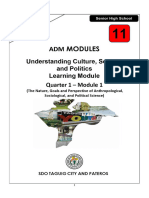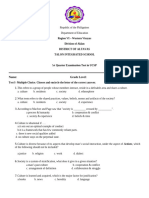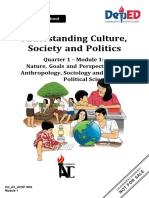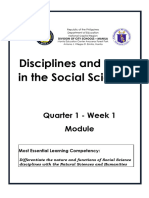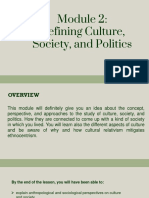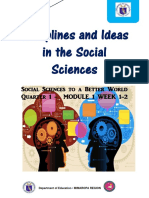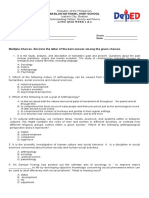0 ratings0% found this document useful (0 votes)
6 viewsQuizz 2
Quizz 2
Uploaded by
Ariel PagoboThe document contains a series of multiple choice questions that test knowledge of key concepts in anthropology and culture. Specifically, it addresses topics like cultural variation, ethnocentrism, anthropology, political science, gender, sex, elements of culture like language, religion, social organization, and material culture. It also defines subdisciplines of anthropology such as physical/biological anthropology, cultural/social anthropology, linguistic anthropology and archaeological anthropology.
Copyright:
© All Rights Reserved
Available Formats
Download as PPTX, PDF, TXT or read online from Scribd
Quizz 2
Quizz 2
Uploaded by
Ariel Pagobo0 ratings0% found this document useful (0 votes)
6 views4 pagesThe document contains a series of multiple choice questions that test knowledge of key concepts in anthropology and culture. Specifically, it addresses topics like cultural variation, ethnocentrism, anthropology, political science, gender, sex, elements of culture like language, religion, social organization, and material culture. It also defines subdisciplines of anthropology such as physical/biological anthropology, cultural/social anthropology, linguistic anthropology and archaeological anthropology.
Original Description:
ppt
Original Title
quizz 2
Copyright
© © All Rights Reserved
Available Formats
PPTX, PDF, TXT or read online from Scribd
Share this document
Did you find this document useful?
Is this content inappropriate?
The document contains a series of multiple choice questions that test knowledge of key concepts in anthropology and culture. Specifically, it addresses topics like cultural variation, ethnocentrism, anthropology, political science, gender, sex, elements of culture like language, religion, social organization, and material culture. It also defines subdisciplines of anthropology such as physical/biological anthropology, cultural/social anthropology, linguistic anthropology and archaeological anthropology.
Copyright:
© All Rights Reserved
Available Formats
Download as PPTX, PDF, TXT or read online from Scribd
Download as pptx, pdf, or txt
0 ratings0% found this document useful (0 votes)
6 views4 pagesQuizz 2
Quizz 2
Uploaded by
Ariel PagoboThe document contains a series of multiple choice questions that test knowledge of key concepts in anthropology and culture. Specifically, it addresses topics like cultural variation, ethnocentrism, anthropology, political science, gender, sex, elements of culture like language, religion, social organization, and material culture. It also defines subdisciplines of anthropology such as physical/biological anthropology, cultural/social anthropology, linguistic anthropology and archaeological anthropology.
Copyright:
© All Rights Reserved
Available Formats
Download as PPTX, PDF, TXT or read online from Scribd
Download as pptx, pdf, or txt
You are on page 1of 4
Direction: Select the letter of your correct answer
1. It refers to the differences in social behaviors that different
cultures exhibit around the world?
a. Cultural variation
b. Anthropology
c. Political Science
d. Ethnocentrism
2. It is a perception that arises from the fact that cultures differ
and each culture defines reality differently or they believe that
their culture is superior than others?
a. Cultural variation
b. Anthropology
c. Political Science
d. Ethnocentrism
3. It refers to the set of attitudes and practices that an individual adheres to in
relation to the political systems and actors within his or her society.
a. Cultural variation
b. Anthropology
c. Political Science
d. Political Identity
4. It is the branch of knowledge which deals with the scientific study of man, his
works, his body, his behavior and values, in time and space. It includes man’s
physical, social, and cultural development that describes and explains the
phenomenon of human life?
a. Cultural variation
b. Anthropology
c. Political Science
d. Political Identity
5. Refers to any information received and perceived to be true?
a. Knowledge
b. Belief
c. Skill
d. Social Norms
6. refers to the biological characteristic of humans such as male or
female, gender categories are more varied, accommodating identities
such as lesbian, gay, bisexual, transgender, queer, and
intexsex(LGBTQI), among others?
a. Gender
b. Sex
c. Class
d. None of the above
7-10. Enumerate the three(3) Elements of Culture?
II. Identify the following
11.Subdiscipline of anthropology that examines the remains
of ancient and historical human populations to promote an
understanding of how humans have adapted to their
environment and developed?
12. Subdiscipline of anthropology that promotes the study of
a society’s culture through their belief systems, practices,
and possessions?
13. Subdiscipline of anthropology Attempts to solve
contemporary problems through the application of theories
and approaches of the discipline?
14. It refers to that complex whole which includes
knowledge, beliefs, arts, morals, laws, customs, and any
other capabilities and habits acquired by man as a member
of society.
You might also like
- Quarter 1 - Module 1: The Nature and Goals of Anthropology, Sociology and Political ScienceDocument8 pagesQuarter 1 - Module 1: The Nature and Goals of Anthropology, Sociology and Political ScienceMark Roland Caceres100% (1)
- Direction: Choose The Letter of The Correct AnswerDocument7 pagesDirection: Choose The Letter of The Correct AnswerAriel PagoboNo ratings yet
- SodapdfDocument15 pagesSodapdfPT MangilaNo ratings yet
- Lesson 1 QuizDocument2 pagesLesson 1 QuizMary Ann IsananNo ratings yet
- UCSP - W1 - Module 1 1 1Document14 pagesUCSP - W1 - Module 1 1 1maryacap819No ratings yet
- UcspDocument4 pagesUcspIvy GonzalesNo ratings yet
- Understanding Culture Society and Politics Quarter 1: Week 1 - Module 1Document15 pagesUnderstanding Culture Society and Politics Quarter 1: Week 1 - Module 1Teds TV100% (5)
- Understanding Culture Society and Politics Quarter 1: Week 1 - Module 1Document15 pagesUnderstanding Culture Society and Politics Quarter 1: Week 1 - Module 1Angelica Robles Amania100% (3)
- Discipline and Ideas in Social ScienceDocument10 pagesDiscipline and Ideas in Social ScienceShaira Mae Pasion ErdajeNo ratings yet
- Directions: Multiple Choice: Write The Letter of The Correct Answer in The SeparateDocument4 pagesDirections: Multiple Choice: Write The Letter of The Correct Answer in The SeparateAngel Camba100% (1)
- Uc 1Document17 pagesUc 1Amanie Usman Amanoddin100% (1)
- UCSPDocument34 pagesUCSPAlshelyn KairanNo ratings yet
- UCSP Week 1Document10 pagesUCSP Week 1Amir AlbashamNo ratings yet
- Understanding CSP Summative TestDocument2 pagesUnderstanding CSP Summative TestAmy Balasan88% (8)
- UnderstandingDocument17 pagesUnderstandingMica mahinayNo ratings yet
- Grade 12 Subjects Pre TestDocument11 pagesGrade 12 Subjects Pre Testzimran dave epelipciaNo ratings yet
- Understanding Culture, Society and Politics: Reviewer 2Document110 pagesUnderstanding Culture, Society and Politics: Reviewer 2ROSE ANN LANDICHONo ratings yet
- Ucsp G12Document2 pagesUcsp G12Rommel EpantoNo ratings yet
- Understanding Culture Society and PoliticsDocument14 pagesUnderstanding Culture Society and PoliticsTessie TayabanNo ratings yet
- Quiz No 1 For CapricornusDocument33 pagesQuiz No 1 For CapricornuspobispoNo ratings yet
- UCSPDocument20 pagesUCSPdaniemarie.oliNo ratings yet
- UCSP-1st Quater ExamDocument6 pagesUCSP-1st Quater Examcindy pioquid100% (1)
- SHS Grade 11 UCSP Week 1Document16 pagesSHS Grade 11 UCSP Week 1Senku IshigamiNo ratings yet
- Ucsp q1 Mod 1 Naturegoalsandperspectivesinanthropologysociologyandpoliticalscience RelayoutDocument25 pagesUcsp q1 Mod 1 Naturegoalsandperspectivesinanthropologysociologyandpoliticalscience RelayoutMarkus Bernabe DaviraNo ratings yet
- Brgy. Naga-Naga Tacloban City S.Y. 2021-2022 First Periodical Exam in Understanding Society, Culture and Politics Test I: Multiple ChoiceDocument5 pagesBrgy. Naga-Naga Tacloban City S.Y. 2021-2022 First Periodical Exam in Understanding Society, Culture and Politics Test I: Multiple ChoiceCalda LynNo ratings yet
- DISS - Q1 - Mod1 - Social Sciences To A Better World STUDENT REFERENCESDocument16 pagesDISS - Q1 - Mod1 - Social Sciences To A Better World STUDENT REFERENCESRonacel AnchetaNo ratings yet
- UCSPDocument12 pagesUCSPRunel CagaraNo ratings yet
- M2 Understanding Culture Society and PoliticsDocument35 pagesM2 Understanding Culture Society and PoliticsAj Myco Estor100% (1)
- Q3 Sy2023-2024 Summative Test Ucsp TVLDocument4 pagesQ3 Sy2023-2024 Summative Test Ucsp TVLpneuma.elcanoNo ratings yet
- UCSP Long QuizDocument10 pagesUCSP Long QuizJanine HeridaNo ratings yet
- Day 1 UcspDocument30 pagesDay 1 UcspNoreL Jan PinedaNo ratings yet
- Understanding Culture, Society & Politics: Quarter 1 - Week 1Document14 pagesUnderstanding Culture, Society & Politics: Quarter 1 - Week 1Michael JunioNo ratings yet
- pRE-tEST aNTHROPOLOGY, sOCIOLOGY, pOLITICAL sCIENCEDocument1 pagepRE-tEST aNTHROPOLOGY, sOCIOLOGY, pOLITICAL sCIENCEMa Jennifer CabatinganNo ratings yet
- 1st Summative USCPDocument2 pages1st Summative USCPNezel100% (2)
- SHS Humss Diss Q1 WK2Document5 pagesSHS Humss Diss Q1 WK2JOEVARIE JUNIONo ratings yet
- Ucsp Module 1 - Week 1Document32 pagesUcsp Module 1 - Week 1Rodman A. Ocampo100% (1)
- Ucsp Week1 Module PDFDocument13 pagesUcsp Week1 Module PDFAaron Mar DulceNo ratings yet
- Pretest Q1Document2 pagesPretest Q1Hsiri IrishNo ratings yet
- 1st Quarter ExaminationucspDocument7 pages1st Quarter ExaminationucspIngrid Gay SalasayoNo ratings yet
- Ucsp Q3 ST1Document3 pagesUcsp Q3 ST1JYNEST CUIZONNo ratings yet
- Pre-Test Directions: Choose The Letter of The Best Answer and Write Your Answer in Your ActivityDocument9 pagesPre-Test Directions: Choose The Letter of The Best Answer and Write Your Answer in Your Activitydubadu wariwari100% (1)
- Palawan State Universit1Document5 pagesPalawan State Universit1Jerone CansinoNo ratings yet
- Understanding Culture, Society and Politics: Department of EducationDocument16 pagesUnderstanding Culture, Society and Politics: Department of Educationjaypee raguroNo ratings yet
- Nature, Goals, and Perspectives in Anthropology, Sociology and Political ScienceDocument32 pagesNature, Goals, and Perspectives in Anthropology, Sociology and Political ScienceJoiemmy Sumedca Bawengan GayudanNo ratings yet
- UCSP Q1Document7 pagesUCSP Q1Desilyn NegrilloNo ratings yet
- First Grading ExamDocument4 pagesFirst Grading ExamJay-ar Mario Valentin Mariano100% (1)
- Test I. True or False: Write True If The Statement Is Correct and False If It Is NotDocument2 pagesTest I. True or False: Write True If The Statement Is Correct and False If It Is NotJ4NV3N G4M1NGNo ratings yet
- Core Ucsp11 12 Semi II Clas1 the-scope-Of-Anthropology-sociology-And-political-science Final (3) - Rhea Ann NavillaDocument15 pagesCore Ucsp11 12 Semi II Clas1 the-scope-Of-Anthropology-sociology-And-political-science Final (3) - Rhea Ann NavillaWaliza Venturillo ValonesNo ratings yet
- Undesrtanding Culture Society and PoliticsDocument11 pagesUndesrtanding Culture Society and PoliticsJayrico Jumawan0% (1)
- Strictly No Erasures!Document6 pagesStrictly No Erasures!Rhea Mae TeroNo ratings yet
- DISS PresentationDocument27 pagesDISS PresentationJohn Paul LibaoNo ratings yet
- Ucsp ReviwDocument13 pagesUcsp ReviwVTheGreatNo ratings yet
- Diss Final Module 1Document13 pagesDiss Final Module 1Jerima PilleNo ratings yet
- Quiz No 1 Make Up ExamDocument33 pagesQuiz No 1 Make Up ExampobispoNo ratings yet
- Understanding Culture Society and Politics Q3 - M1Document2 pagesUnderstanding Culture Society and Politics Q3 - M1HENJEL PERALESNo ratings yet
- Local Media2590002275694260402Document3 pagesLocal Media2590002275694260402Celesmin MendozaNo ratings yet
- Ucsp q1 m1 w1 Sy21 22 ModuleDocument21 pagesUcsp q1 m1 w1 Sy21 22 Moduletobiasangelika19No ratings yet
- MODULE 1.pptx UcspDocument22 pagesMODULE 1.pptx UcspAnne MoralesNo ratings yet
- The Ethics of Knowledge Creation: Transactions, Relations, and PersonsFrom EverandThe Ethics of Knowledge Creation: Transactions, Relations, and PersonsNo ratings yet
- PE11 Q4 Modules4b Weeks3and4Document11 pagesPE11 Q4 Modules4b Weeks3and4Ariel PagoboNo ratings yet
- TVL - Computer Systems Servicing (Ncii)Document1 pageTVL - Computer Systems Servicing (Ncii)Ariel PagoboNo ratings yet
- Class Officers: Ramon T. Diaz National High SchoolDocument1 pageClass Officers: Ramon T. Diaz National High SchoolAriel PagoboNo ratings yet
- PE11 Q4 Module4a Weeks1and2Document19 pagesPE11 Q4 Module4a Weeks1and2Ariel PagoboNo ratings yet
- Jay Hubbel B. Lejas: Jovito O. CabalquintoDocument1 pageJay Hubbel B. Lejas: Jovito O. CabalquintoAriel PagoboNo ratings yet
- Activism Using HashtagsDocument1 pageActivism Using HashtagsAriel PagoboNo ratings yet
- Announcement: To All The Parents of Css A - 11Document1 pageAnnouncement: To All The Parents of Css A - 11Ariel PagoboNo ratings yet
- Nathan M. Beldad: With HonorsDocument1 pageNathan M. Beldad: With HonorsAriel PagoboNo ratings yet
- Dawin M. Casaljay: With HonorsDocument1 pageDawin M. Casaljay: With HonorsAriel PagoboNo ratings yet
- Josua S. Encila: With HonorsDocument1 pageJosua S. Encila: With HonorsAriel PagoboNo ratings yet
- Q4 Reviewer in Contemporary ArtDocument2 pagesQ4 Reviewer in Contemporary ArtAriel PagoboNo ratings yet
- BenictionDocument1 pageBenictionAriel PagoboNo ratings yet
- PresentationDocument8 pagesPresentationAriel PagoboNo ratings yet
- Refers To The Differences in Social Behaviors That Different Cultures Exhibit Around The WorldDocument20 pagesRefers To The Differences in Social Behaviors That Different Cultures Exhibit Around The WorldAriel PagoboNo ratings yet
- Ucsp 22Document53 pagesUcsp 22Ariel PagoboNo ratings yet
- Social OrganizationDocument9 pagesSocial OrganizationAriel PagoboNo ratings yet
- Human OriginsDocument9 pagesHuman OriginsAriel PagoboNo ratings yet
- Man'S Social and Cultural Background: "Change Is The Only Permanent Thing in This World." - HeraclitusDocument29 pagesMan'S Social and Cultural Background: "Change Is The Only Permanent Thing in This World." - HeraclitusAriel Pagobo100% (1)
- Answer The Following QuestionsDocument2 pagesAnswer The Following QuestionsAriel PagoboNo ratings yet
- Answer The Following QuestionsDocument2 pagesAnswer The Following QuestionsAriel PagoboNo ratings yet
- Man'S Social and Cultural BackgroundDocument11 pagesMan'S Social and Cultural BackgroundAriel PagoboNo ratings yet












